- Home
- War in the Middle East
- Is the Iranian Axis on the Defensive?
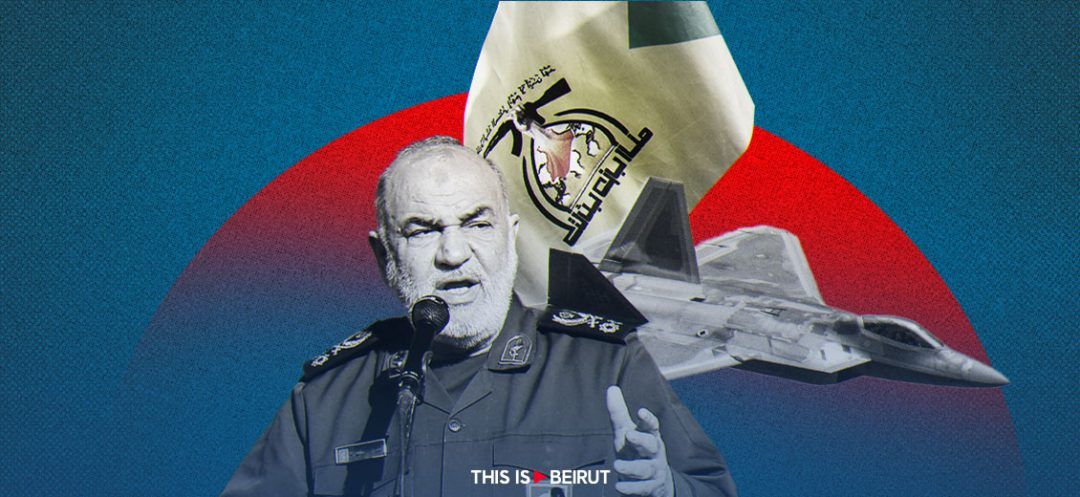
In the days following the drone attack on the Syrian-Jordanian border, two key players within the Iranian axis announced the suspension of their attacks on American positions in Iraq and Syria. Amid fears of retaliation and a wish to negotiate from a position of strength, let's revisit this unexpected turn of events.
On Tuesday, January 30, the Kataeb Hezbollah, an influential pro-Iran armed group in Iraq, announced the "suspension" of their military operations against US troops. "We announce the cessation of our military and security operations against the occupying forces to avoid any embarrassment to the Iraqi government," the group stated on its website in a release signed by its Secretary-General, Abu Hussein al-Hamidawi.
The next day, the Islamic Revolutionary Guard Corps (IRGC) followed suit. According to information reported by the Syrian Observatory for Human Rights (SOHR), Tehran's ideological army allegedly instructed the groups under its control in Syria to "cease their military activities against US bases in Syria."
Simultaneously, the London-based Syrian NGO reported that "maximum alert status has been maintained" for the past two days "in all sites of Iranian militias in the Syrian desert and in Deir ez-Zor." The state of alert has also extended to Iran's Iraqi allies, the Popular Mobilization Forces (Al-Hashd al-Shaabi).
Far from being trivial, the timing of these statements is clearly linked to the aftermath of the drone attack that claimed the lives of three American soldiers on the Syrian-Jordanian border in the night of Saturday to Sunday, January 28. President Joe Biden subsequently promised "significant" retaliation, accusing Iran of providing the needed weaponry for the strike.
Since then, US officials have been making numerous threatening statements. Most experts, such as retired Lebanese General Khalil Helou, concur that the American response is imminent.
[readmore url="https://thisisbeirut.com.lb/world/221844"]
The main unknown factor revolves around the scale of the retaliation: will it involve limited strikes targeting only pro-Iranian groups, or will it escalate to a broader action, potentially including—a dreaded scenario—strikes against infrastructure in Iran?
Notably, several anonymous US military officials have suggested that the success of the weekend drone strike may owe more to luck than to a meticulously planned operation. Reportedly, the Iranian unmanned aerial vehicle breached the security perimeter of the "Tower 22" base at the same time as another American drone.
The confusion arising from this timing might have enabled the Iranian drone to achieve its objective. This raises an underlying question: was the Iranian device deliberately tracking its American counterpart, or is it merely a fortunate coincidence?
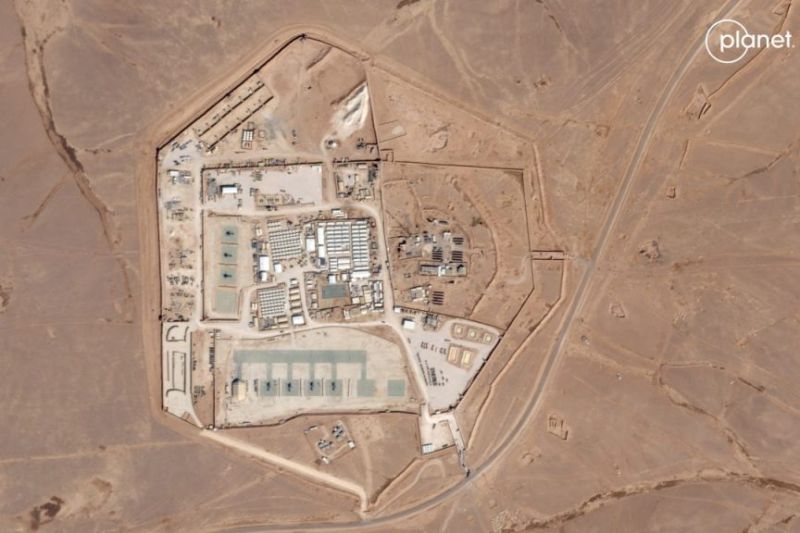 Handout satellite picture released on January 29, 2024 by Planet Labs PBC showing a view of Tower 22 base, near Jordan's border with Iraq and Syria in the northeastern Rwaished District. (Planet Labs, AFP)
Handout satellite picture released on January 29, 2024 by Planet Labs PBC showing a view of Tower 22 base, near Jordan's border with Iraq and Syria in the northeastern Rwaished District. (Planet Labs, AFP)
In the case of the first hypothesis, the attack would constitute a show of strength by the Iranian camp. It would highlight their ability to exploit on-the-ground intelligence—here, by monitoring the movements of US aircraft—to execute a targeted operation, deceiving the adversary.
In this scenario, the suspension of operations could be interpreted as an opening to negotiations after a show of force.
On the other hand (the second hypothesis), the result of the strike might not align with the initial goal sought by the attacker, especially considering that American bases in the region are heavily protected, especially against drones.
[readmore url="https://thisisbeirut.com.lb/world/221971"]
What began as a kind of "mild harassment" on the part of Iran might have escalated into a misstep. In this case, the IRGC's decision appears to be primarily driven by the fear of repercussions from the American response and constitutes an attempt to "spare" the latter.
Can we, however, interpret these recent developments as indications of an unexpected easing of tensions? Nothing could be less certain. Reacting to the announcement of Kataeb Hezbollah during a press briefing in Washington, Pentagon Spokesperson Pat Ryder stated that "actions speak louder than words."
"We urged Iranian-backed groups to cease their attacks. They did not comply. Therefore, we will respond at the time and in the manner of our choosing," he emphasized.
The Biden administration will respond firmly, as highlighted by General Khalil Helou, especially considering the upcoming US election schedule.
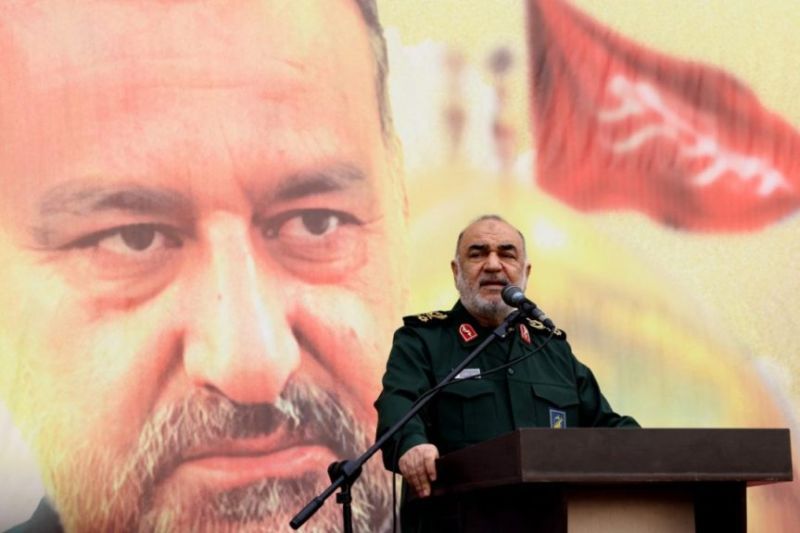 Head of Iran's Islamic Revolutionary Guard Corps (IRGC), Hossein Salami, delivers a speech in Tehran, December 28, 2023. (Atta KENARE, AFP)
Head of Iran's Islamic Revolutionary Guard Corps (IRGC), Hossein Salami, delivers a speech in Tehran, December 28, 2023. (Atta KENARE, AFP)
On the Iranian side, Hossein Salami, the Commander-in-Chief of the IRGC, stated that Tehran was undeterred by the prospect of a direct military confrontation with Washington. "These days, we hear threats from American officials, to whom we say [...]: We do not let any threat go unanswered, and we are not asking for a war, but we are also not afraid of it," he asserted, according to state media.
Ultimately, the only statement pointing towards a tangible de-escalation comes from Kataeb Hezbollah. Following their announcement, Al-Hadath reported that they explicitly stated their commitment not to retaliate against any potential American strike targeting them, at least until further instructions from their Iranian sponsor.
On Tuesday, January 30, the Kataeb Hezbollah, an influential pro-Iran armed group in Iraq, announced the "suspension" of their military operations against US troops. "We announce the cessation of our military and security operations against the occupying forces to avoid any embarrassment to the Iraqi government," the group stated on its website in a release signed by its Secretary-General, Abu Hussein al-Hamidawi.
The next day, the Islamic Revolutionary Guard Corps (IRGC) followed suit. According to information reported by the Syrian Observatory for Human Rights (SOHR), Tehran's ideological army allegedly instructed the groups under its control in Syria to "cease their military activities against US bases in Syria."
#المرصد_السوري
"الـ ـحـ ـرس الـ ـثـ ـوري" #الإيراني يوعز للـ ـمـ ـيـ ـلـ ـيـ ـشـ ـيـ ـات في #سورية بإيقاف أنشطتها العسكرية ضد القواعد #الأمريكيةhttps://t.co/TXiCVs2fOr
— المرصد السوري لحقوق الإنسان (@syriahr)#المرصد_السوري
"الـ ـحـ ـرس الـ ـثـ ـوري" #الإيراني يوعز للـ ـمـ ـيـ ـلـ ـيـ ـشـ ـيـ ـات في #سورية بإيقاف أنشطتها العسكرية ضد القواعد #الأمريكيةhttps://t.co/TXiCVs2fOr— المرصد السوري لحقوق الإنسان (@syriahr) January 31, 2024
Simultaneously, the London-based Syrian NGO reported that "maximum alert status has been maintained" for the past two days "in all sites of Iranian militias in the Syrian desert and in Deir ez-Zor." The state of alert has also extended to Iran's Iraqi allies, the Popular Mobilization Forces (Al-Hashd al-Shaabi).
The US Is Gearing Up for Retaliation
Far from being trivial, the timing of these statements is clearly linked to the aftermath of the drone attack that claimed the lives of three American soldiers on the Syrian-Jordanian border in the night of Saturday to Sunday, January 28. President Joe Biden subsequently promised "significant" retaliation, accusing Iran of providing the needed weaponry for the strike.
Since then, US officials have been making numerous threatening statements. Most experts, such as retired Lebanese General Khalil Helou, concur that the American response is imminent.
[readmore url="https://thisisbeirut.com.lb/world/221844"]
The main unknown factor revolves around the scale of the retaliation: will it involve limited strikes targeting only pro-Iranian groups, or will it escalate to a broader action, potentially including—a dreaded scenario—strikes against infrastructure in Iran?
Notably, several anonymous US military officials have suggested that the success of the weekend drone strike may owe more to luck than to a meticulously planned operation. Reportedly, the Iranian unmanned aerial vehicle breached the security perimeter of the "Tower 22" base at the same time as another American drone.
Iranian Victory or Concern?
The confusion arising from this timing might have enabled the Iranian drone to achieve its objective. This raises an underlying question: was the Iranian device deliberately tracking its American counterpart, or is it merely a fortunate coincidence?
 Handout satellite picture released on January 29, 2024 by Planet Labs PBC showing a view of Tower 22 base, near Jordan's border with Iraq and Syria in the northeastern Rwaished District. (Planet Labs, AFP)
Handout satellite picture released on January 29, 2024 by Planet Labs PBC showing a view of Tower 22 base, near Jordan's border with Iraq and Syria in the northeastern Rwaished District. (Planet Labs, AFP)In the case of the first hypothesis, the attack would constitute a show of strength by the Iranian camp. It would highlight their ability to exploit on-the-ground intelligence—here, by monitoring the movements of US aircraft—to execute a targeted operation, deceiving the adversary.
In this scenario, the suspension of operations could be interpreted as an opening to negotiations after a show of force.
On the other hand (the second hypothesis), the result of the strike might not align with the initial goal sought by the attacker, especially considering that American bases in the region are heavily protected, especially against drones.
[readmore url="https://thisisbeirut.com.lb/world/221971"]
What began as a kind of "mild harassment" on the part of Iran might have escalated into a misstep. In this case, the IRGC's decision appears to be primarily driven by the fear of repercussions from the American response and constitutes an attempt to "spare" the latter.
A Desire for a Moderate De-escalation
Can we, however, interpret these recent developments as indications of an unexpected easing of tensions? Nothing could be less certain. Reacting to the announcement of Kataeb Hezbollah during a press briefing in Washington, Pentagon Spokesperson Pat Ryder stated that "actions speak louder than words."
"We urged Iranian-backed groups to cease their attacks. They did not comply. Therefore, we will respond at the time and in the manner of our choosing," he emphasized.
The Biden administration will respond firmly, as highlighted by General Khalil Helou, especially considering the upcoming US election schedule.
 Head of Iran's Islamic Revolutionary Guard Corps (IRGC), Hossein Salami, delivers a speech in Tehran, December 28, 2023. (Atta KENARE, AFP)
Head of Iran's Islamic Revolutionary Guard Corps (IRGC), Hossein Salami, delivers a speech in Tehran, December 28, 2023. (Atta KENARE, AFP)On the Iranian side, Hossein Salami, the Commander-in-Chief of the IRGC, stated that Tehran was undeterred by the prospect of a direct military confrontation with Washington. "These days, we hear threats from American officials, to whom we say [...]: We do not let any threat go unanswered, and we are not asking for a war, but we are also not afraid of it," he asserted, according to state media.
Ultimately, the only statement pointing towards a tangible de-escalation comes from Kataeb Hezbollah. Following their announcement, Al-Hadath reported that they explicitly stated their commitment not to retaliate against any potential American strike targeting them, at least until further instructions from their Iranian sponsor.
Read more

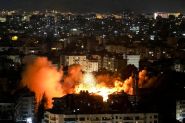
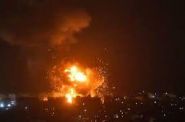

Comments